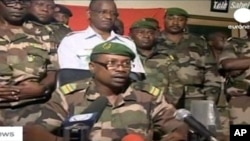Soldiers in Niger have named a new military leader following Thursday's coup against President Mamadou Tandja.
Squadron chief Salou Djibo leads Niger's new Supreme Council for the Restoration of Democracy. He commands a heavy artillery unit that played a key role in Thursday's attack on the presidential palace.
President Tandja was detained while holding a cabinet meeting. He is now reportedly being held at a military barracks outside the capital.
After initially announcing the dissolution of the entire government, coup leaders say Tandja ministers will keep their jobs for the time being.
Soldiers suspended the constitution, but they have lifted a dusk-to-dawn curfew and Friday re-opened the country's borders. A reporter for VOA in Niamey says government offices and banks opened normally Friday, markets were busy and public transport operated as usual.
Announcing the coup late Thursday, Colonel Abdoul Karim Goukoye Karimou said Niger's defense and security forces took responsibility to end the country's tense political situation.
Colonel Karimou says soldiers are asking the people of Niger to remain calm and stay united around the ideals of the Supreme Council for the Restoration of Democracy which he says will be able to make Niger an example of democracy and good governance, in keeping with other countries and the price of peace and stability.
The African Union has condemned the coup and is calling for a quick return to democracy. The head of the Economic Community of West African states, acting Nigerian President Goodluck Jonathan, called on Niger's opposition leaders and security forces to resolve the constitutional crisis through dialogue.
U.S. Assistant Secretary of State Johnnie Carson says Washington opposes the coup. "We hope that those who have taken power in Niger will act very quickly and swiftly to move to a transition government that will lead to elections and a resumption of democratic constitutional rule in that country." he said.
President Tandja grew increasingly unpopular since an August referendum that changed the constitution to expand his powers and give him another three years in office.
When Niger's constitutional court and parliament said the referendum was illegal, President Tandja replaced them with new judges and new lawmakers who backed his new government.
Regional diplomats had been trying to negotiate a power-sharing agreement that would have allowed President Tandja to stay in office while an interim government organized new elections.
They must now work with the country's new military leaders to return Niger to constitutional rule. Two of the men involved in this coup - Dijibrilla Hima Mamidou and Abdoulaye Adamou Harouna - played big parts in Niger's 1999 coup. That take-over lasted less than a year before the military held elections that were won by President Tandja.
Political analyst Kouly Mahamane says military action was the only way out of Niger's political impasse.
Before the coup, there were two camps in Niger - the president's political opponents who wanted to return to the previous constitution, and the president's supporters who wanted to continue with the new government created after the August referendum. Mahamane says the way out of the crisis should have been through compromise. As there was no compromise, Mahamane says the only way to resolve the crisis was through this coup d'etat.
Opposition politician Alat Mogaskya says he hopes the country's new military leaders will quickly restore democracy.
Mogaskya says no politicians are surprised by the coup because President Tandja stole power and refused to talk to the opposition, so the only way forward was military action. He says President Tandja knew that the previous government ended with a military coup, so why would his own government not end the same way?
Mogaskya says no one is surprised about what has happened, not even President Tandja.
This Niamey businessman said Niger's problems should have been solved through consensus. But he says unfortunately, soldiers have taken power. So the people of Niger are now asking them to organize elections in the shortest time possible.
This civil servant returned to work as usual Friday, pleased that the tension of the last few months has finally broken.
He says everyone was waiting for something to happen at anytime because there was no agreement between the parties. He says the biggest problem now is not the coup but keeping Niger from going backwards.
Soldiers Name New Leader in Niger, International Community Opposes Coup












